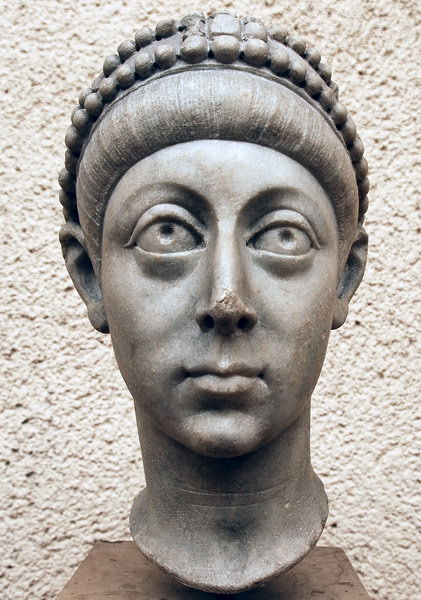Synesius, On Imperial Rule 4
 In his speech On Imperial Rule (or On Monarchy), Synesius of Cyrene offers some advise to the emperor Arcadius (r.395-408). More information about this speech, together with a brief summary, can be found here.
In his speech On Imperial Rule (or On Monarchy), Synesius of Cyrene offers some advise to the emperor Arcadius (r.395-408). More information about this speech, together with a brief summary, can be found here.
Throughout this speech, the word "Scythians" refers to the Tervingian Germans (who would later be known as Visigoths), whereas "king" refers to emperor.
The text is offered here in the translation by A. Fitzgerald. The four-digit numbers are page numbers of the Migne edition.
On Imperial Rule 4
[1] [1065] I will now make a statement which sounds at first a paradox, but is perchance impregnated with truth itself. Whenever I compare weakness with force, poverty with wealth, and penury in all things with abundance in all things, and if these might be adjudged in regard to each other unmixed with, nay, even separated from, prudence, then poverty, helplessness, and a private life, rather than the greatest leadership, would seem more fortunate for those who have least attained to intelligence and reason. Assuredly they would fall into fewer errors, since the evil in their dispositions would not find an outlet for its energy.
[2] For the exterior forms of good things which my leaders Aristotle and Plato are accustomed to call the instrumental,note know how to serve the vices no less than the virtues. Consequently these men and as many torrents of philosophy as have run from them, neither esteemed them worthy of the better title, nor did they relegate them to worse, but call them instruments, at one moment for good and another for evil, depicting them in various colors according to the disposition of those who employed them.
[3] As it is therefore to be prayed for that the "instruments" be out of the evil man's reach so that he may keep his wickedness inactive, so it is that they may be in the hands of one who will use them aright, one by whom all cities and individuals as well may benefit, to the end that his virtuous nature may not wither away without employ, without result, and without recognition, but may spend its force for the wellbeing of men. Use in this way, I entreat you, the good elements which lie ready for you; it is only in this way that you may use things that are good. Let houses, cities, peoples, races, and continents have the benefit of earnest solicitude and forethought, a forethought which God Himself, who has placed Himself as the archetype amidst knowable things, offers you as an image of His own.
[4] He wishes that everything here should be arranged in imitation of the world above. Beloved, then, of the Great King is the one named after Him here, if only he belie not that name. And he does not so belie it if even one or other of these titles of Divinity is present with him. Now, before speaking of this, it would not be ill-timed to discuss first a certain matter concerning philosophy so to make what follows clearer.